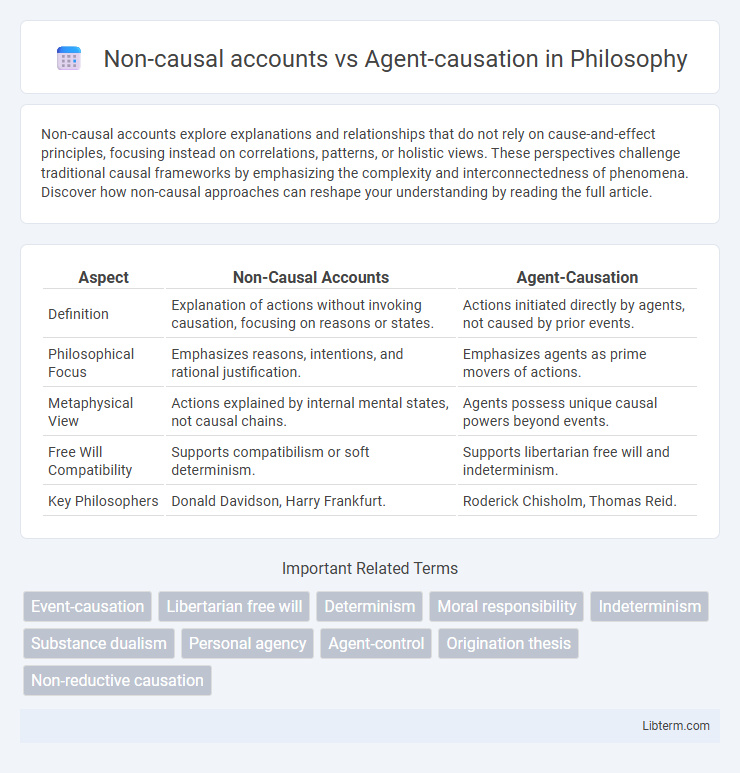Non-causal accounts explore explanations and relationships that do not rely on cause-and-effect principles, focusing instead on correlations, patterns, or holistic views. These perspectives challenge traditional causal frameworks by emphasizing the complexity and interconnectedness of phenomena. Discover how non-causal approaches can reshape your understanding by reading the full article.
Table of Comparison
| Aspect | Non-Causal Accounts | Agent-Causation |
|---|---|---|
| Definition | Explanation of actions without invoking causation, focusing on reasons or states. | Actions initiated directly by agents, not caused by prior events. |
| Philosophical Focus | Emphasizes reasons, intentions, and rational justification. | Emphasizes agents as prime movers of actions. |
| Metaphysical View | Actions explained by internal mental states, not causal chains. | Agents possess unique causal powers beyond events. |
| Free Will Compatibility | Supports compatibilism or soft determinism. | Supports libertarian free will and indeterminism. |
| Key Philosophers | Donald Davidson, Harry Frankfurt. | Roderick Chisholm, Thomas Reid. |
Introduction to Causation in Philosophy
Non-causal accounts in philosophy challenge traditional views by denying that causation is necessary for agents to bring about actions, emphasizing alternative explanations such as grounding or metaphysical dependence. Agent-causation posits that agents themselves are the originators of causal chains, asserting that individuals have the power to initiate actions independently of prior events. This distinction is central to debates in the philosophy of free will and moral responsibility, highlighting contrasting frameworks for understanding how actions are caused or grounded.
Defining Non-causal Accounts
Non-causal accounts define agency by emphasizing the role of reasons, intentions, or rational deliberations as sufficient grounds for actions, without requiring direct causal influence. These accounts argue that agents act because of their mental states, which provide normative explanations rather than mechanistic causal links. Unlike agent-causation, which posits agents as prime movers causing actions independently of prior events, non-causal views frame agency in terms of justificatory or explanatory frameworks grounded in reasons.
Understanding Agent-causation
Agent-causation emphasizes the role of agents as originators of actions, positing that agents themselves can initiate causation independently of prior events or states. This concept contrasts with non-causal accounts that explain agency without invoking causal powers attributed to agents, often reducing actions to events caused by preceding factors. Understanding agent-causation involves recognizing agents as fundamental sources of causal influence, which preserves notions of free will and moral responsibility.
Key Differences Between Non-causal and Agent-causation Views
Non-causal accounts explain free will without invoking causation, emphasizing autonomy and self-determination while rejecting traditional cause-and-effect frameworks. Agent-causation posits that agents themselves are the originators of actions, acting as prime movers independent of prior events. The key difference lies in non-causal views denying causal chains in freedom, whereas agent-causation centers on agents as unique causal sources actively producing actions.
Major Proponents and Historical Background
Major proponents of non-causal accounts include David Hume, who emphasized regularity theories of causation, and contemporary philosophers like Galen Strawson, who explore mental causation without direct causal links. Agent-causation is prominently defended by Roderick Chisholm and Thomas Reid, who argue that agents themselves can initiate actions independently of prior events. Historically, agent-causation traces back to Aristotelian notions of active agents, while non-causal accounts emerged from Enlightenment critiques of metaphysical causation.
Arguments Supporting Non-causal Accounts
Non-causal accounts argue that mental events or intentions are not causes but rather reasons that explain actions, emphasizing rational justification over physical causation. Philosophers like Donald Davidson support this by highlighting the explanatory power of reasons as causes for behavior, focusing on the intentionality and meaning behind actions rather than deterministic causality. Empirical findings in cognitive science showing discrepancies between neural activity and conscious decision-making further bolster non-causal explanations by suggesting that causation may not fully account for agent's rational capacity.
Arguments Favoring Agent-causation
Agent-causation theory posits that agents themselves initiate actions independently of prior events, providing a robust framework for free will that non-causal accounts struggle to explain. Proponents argue this model better accounts for moral responsibility, as agents are seen as originators of actions rather than mere links in causal chains. Philosophers such as Roderick Chisholm emphasize that agent-causation preserves autonomy and intentionality, which are often compromised in purely non-causal or event-causal theories.
Criticisms and Challenges for Each Approach
Non-causal accounts face criticisms for their difficulty in explaining how agents have genuine control over actions without invoking causation, often being challenged on grounds of coherence and explanatory power. Agent-causation theories confront challenges in clarifying the metaphysical nature of agents as initiators of causal chains, with critics questioning the ontological plausibility and potential circularity of agent-based causal power. Both approaches grapple with reconciling intuitive notions of free will with a rigorous philosophical framework, leading to ongoing debates about their respective conceptual and empirical viability.
Impact on Free Will and Moral Responsibility
Non-causal accounts of free will emphasize mental states and reasons as the basis for actions, arguing that free will arises from rational deliberation rather than direct causal chains. Agent-causation theory posits that agents themselves initiate actions independently of causal determinism, asserting personal authorship and control. This distinction affects moral responsibility by grounding accountability either in the reasoning processes behind decisions or in the agent's intrinsic capacity to cause actions, shaping debates in philosophy of mind and ethics.
Contemporary Debates and Future Directions
Contemporary debates in philosophy of action emphasize the tension between non-causal accounts, which reject causation as essential for agency, and agent-causation theories that ascribe causal powers directly to agents. Critics challenge non-causal models for lacking explanatory power in accounting for intentional actions, while proponent arguments highlight agent-causation's potential to preserve libertarian free will against deterministic frameworks. Future directions involve integrating insights from cognitive science and metaphysics to reconcile agent-driven causation with empirical findings about action initiation and deliberation processes.
Non-causal accounts Infographic

 libterm.com
libterm.com